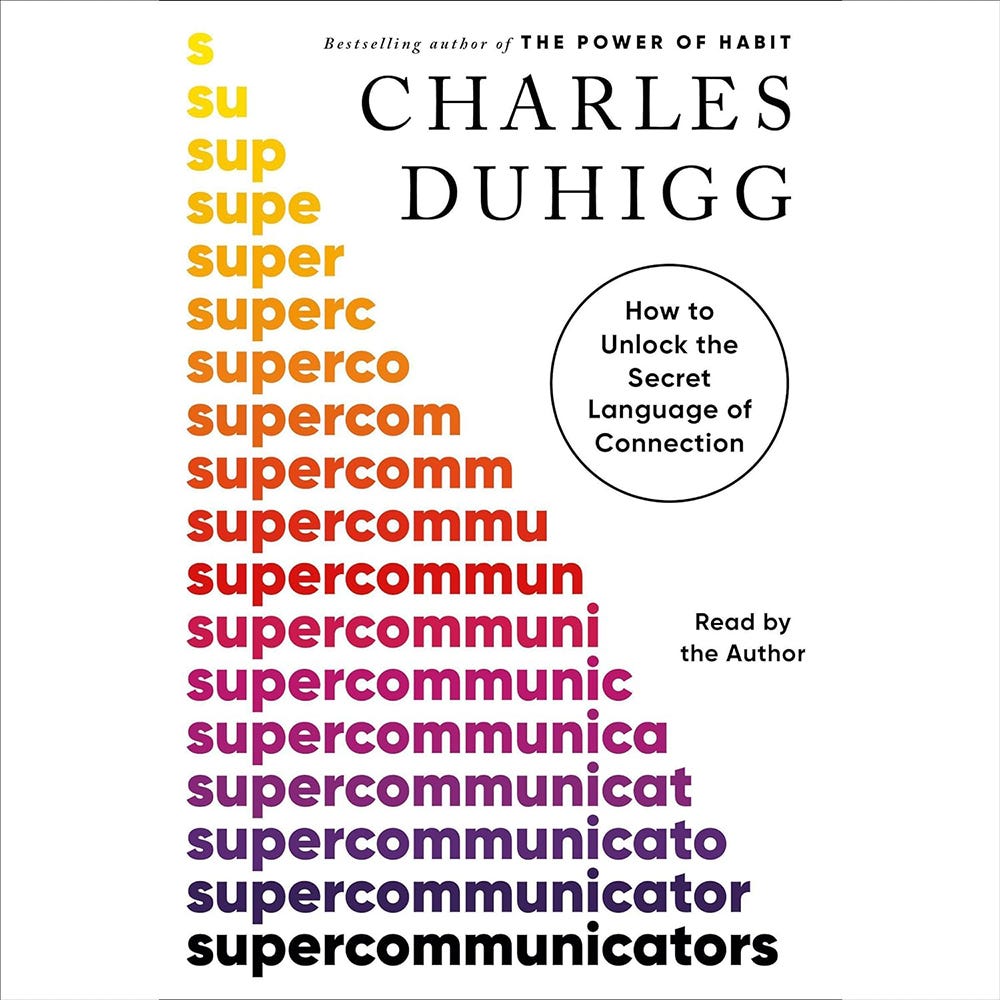Hello there!
Matt here from MessageUp, with the latest newsletter in our new monthly format.
If you’re a regular reader, thank you for remaining loyal to our Substack. If you’re new to these parts—welcome! We’d love to hear what you think.
In this newsletter, you’ll find:
An update on our B2B Builders community.
A discussion on positivity bias and the challenges a leader faces when things don’t work out as planned.
Summaries of our latest blog posts, the most recent of which discussed building a fit-for-purpose marketing technology stack at a growing B2B business.
A book review and recommendation.
Two article reviews, both related to recent search engine updates that try to spot AI-generated content and prioritize material written by humans.
To see more of our content, follow us on LinkedIn.
Cheers,
~ Matt
Business Update
Last month, we heralded an important step in the development of our online community, B2B Builders—opening the platform to beta testers.
This month, we’re bummed to report that we’ve shut the program down—at least for now.
During the private beta, we hoped to check three important boxes:
Confirm that the technology worked to beta testers’ satisfaction.
Start some basic conversations, so that the next cohort of members would see activity as soon as they arrived.
Recruit a critical mass of Founder Members to sustain the community while we moved into “fast follower” recruitment mode.
Passing the first checkpoint was easy. We built the community site on the Mighty Networks platform, which gave us plenty of out-of-the-box functionality.
The second checkpoint was way harder than we expected. Even though our beta testers were people who had responded enthusiastically to our outreach and taken the necessary steps to join the community, the level of interaction was very low.
The third checkpoint, which we pursued in parallel with the beta test was also a sharp disappointment. Although nearly fifty percent of CEOs who responded to our invitation said they were ready to get involved as soon as we had the community up and running, most of them have ghosted us since.
These are bitter pills to swallow, but that’s why we set up a rigorous test and launch process. As tempting as it might be to make excuses and blunder onward, the data says otherwise.
As you know, we were super excited to add this community to the MessageUp portfolio. Perhaps we yet will, after some reconsideration and redesign. We’re busy reviewing the data and looking for ways to make the value proposition more compelling and the target audience less nebulous (two of the likely root causes of this setback).
If you took part in the beta test, thank you. Your feedback was important and will be invaluable as we take stock and decide what next.
If you were hoping to join the community as it took off, sorry for the disappointment. Stick around while we reformulate and feel free to send us your ideas for how we can build and market this most effectively.
And now, onto the bigger learnings we’re taking away from this…
Negative Results
The behavioral psychologists, Daniel Kahneman and Amos Tversky identified a fundamental asymmetry between how people assess—and react to—gains and losses.
Across a wide series of experiments, they showed that we experience much greater pain at a certain level of loss than we do happiness at a similarly sized gain.
This leads to a phenomenon called “loss aversion,” where we skew our risk taking toward (what we perceive to be) more likely gains and away from more likely losses.
You can see this behavior at work throughout society, where it both protects us from getting eaten by lions (our ancient “lizard brain” at work) and leads to our exploitation by fear-mongering marketers.
Many a successful marketing campaign has been constructed around sowing “fear, uncertainty, and doubt” in the minds of the target audience.
We view failure as something to be avoided at all costs, structuring our projects for near-certain success—which can lead to gross over-design (“gold-plating”) and excessive costs .
How to counteract these biases is a topic for another day—one best tackled by reading the excellent works of Kahneman and others.
Here, I want to focus on one consequence of our positivity bias: the difficulty we face in accepting negative results.
As I explained above, we have experienced just such a situation with the unsuccessful launch of our online community.
Needless to say, we were expecting to check each of the boxes and move swiftly on to the next step.
Despite designing these checkpoints precisely because we knew the outcome was uncertain, we had mentally dismissed that uncertainty and assumed we would succeed. We assumed the unknown would turn out to be positive while, in reality, it was not.
It feels dumb to be so disappointed. It’s awkward to face the truth.
We feel failure in having to write these words—like a schoolkid who’s forced to write an apology for doing something wrong.
We are far better served by viewing the beta test as a successful experiment that disproved our theories about member participation.
Easy for you to say, our wounded ego grumbles.
Here are four things we’re taking away from this episode:
Creating a staged process with clear definitions of success has helped us make a difficult decision (in this case, not to continue). Consider following a similar approach whenever there is material uncertainty in outcomes.
If you feel confident about a positive outcome, remain alert to positivity bias and wishful thinking. Unknowns are unknowns. We perceive upside and downside risks differently and often inaccurately.
The culture at MessageUp encourages experimentation and views failure as an opportunity to learn and grow, but negative results still sting. Be considerate of how people are feeling when success doesn’t happen and difficult decisions must be made.
Our “System 1” brain fires off unhappy signals in response to negative news, including anger, hurt, shame, and blame. Fortunately, after a hot minute, “System 2” rationalizes the situation and replaces some of the negativity with acceptance. Even so, the asymmetry hard-coded into our operating system makes negative outcomes more difficult to deal with than positive ones. Keep this in mind when leading teams through uncertain territory, where setbacks are inevitable.
Hopefully something on this list will prove valuable to us—and to you—moving forwards.
Recent Posts on The Framework Blog
Building a High-Impact Marketing Technology Stack for a Growth Stage B2B Business (June 5, 2024)
Assembling the right marketing technology stack can be instrumental in today's fast-paced digital environment, but with an overwhelming array of available options, it can be hard to tell which tools are truly essential, and which can be added later.
This post outlines what we believe are the 10 most important tools a small company marketing team will need, along with some important features they should possess.
We also discuss the pros and cons of choosing integrated software platforms versus discrete best-in-class tools, and the strategic importance of investing in technology early in a company's life.
Does Extreme B2B Content Marketing Work? (May 8, 2024)
We're inundated by so many blaring headlines and graphic images that we gradually become numb to them and tune them out.
In the B2B domain, we're accustomed to staid, if not downright boring, content. Extreme headlines—whether positive or negative—can be jarring.
So, why does extreme content marketing persist? And, does it work?
In this post, we uncover the reasons why marketers resort to extreme content and discuss the pros and cons for grabbing and holding the attention of your target audience.
Book Report
Supercommunicators - Charles Duhigg (Print and Audiobook 2024)
Throughout life, we find ourselves involved in difficult conversations.
Whether at work, at home, or in a social setting, something controversial gets said—or a sensitive topic gets raised—and tensions rise.
We shy away from contributing for fear of saying the wrong thing. We inadvertently offend someone with a comment or turn of phrase. We get offended by another person’s apparent ignorance, bias, or insensitivity.
There’s nothing wrong with any of those reactions; they are an inevitable part of the messy process that happens when people with different backgrounds exchange views on highly nuanced subjects.
It becomes a problem when conversation turns into confrontation or conflict, or when conversation ceases because it becomes too uncomfortable.
Duhigg breaks difficult conversations into three distinct parts: factual, emotional, and identity conversations.
By recognizing each of them and learning to tackle each one separately, we can significantly improve our chances of succeeding under difficult circumstances.
Furthermore, from our point of view, much of what Duhigg describes in this book can be applied—almost verbatim—to business marketing.
Duhigg writes: “Achieving authentic, meaningful connection is the most important thing in life.”
Which leads us to propose: “Achieving authentic, meaningful connection with its stakeholders is the most valuable thing a business can do.”
Supercommunicators is a highly worthwhile read, both as a guide to improving your own communication skills and as a prompt for superior marketing strategy discussions.
What We’ve Been Reading
Both of this month’s articles were written in response to what we see as content marketing’s “crisis of the moment”—a tsunami of AI-generated content that’s drowning out genuine, authentic, human-written material.
The first article deals with the rising influence of user experience and technical SEO on website rankings.
The second piece addresses search engine algorithm updates that attempt—with varying degrees of success—to identify AI-generated work and prioritize human-generated content, and how to make sure your content gets labeled appropriately.
Technical SEO for B2B Websites: Ensuring Crawling and Indexing
Java Iyer, Marketing Profs, April 2024
Iyer reports on recent updates in search engine algorithms—partly in response to the rise of generative AI—that mean user experience (UX) and technical SEO will play a bigger role in B2B website rankings than before.
Is Your Content Strategy Lacking? AI May Be To Blame
Andrew Kirkcaldy, Demand Gen Report, May 2024
The rise and rise of AI-assisted—and even, AI-generated—content has prompted search providers, including Google's core search algorithm, to make updates that prioritize originality.
This timely piece by Andrew Kirkcaldy explains why some human content is getting "thrown out with the bath water", and what you can do to maximize your content’s chances of being correctly identified as having human origins.






